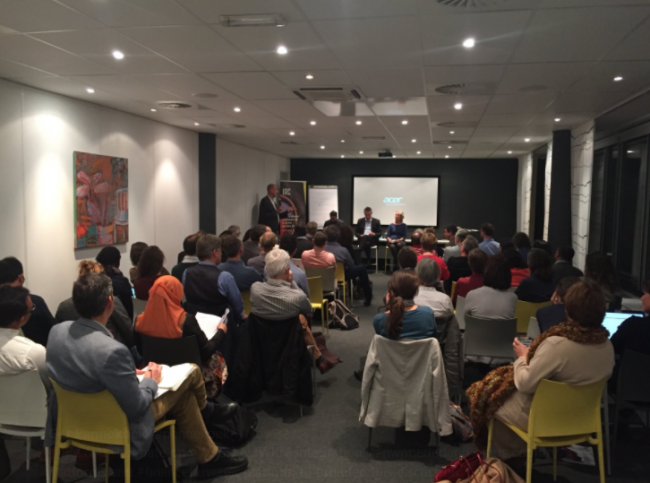Achieving sustainable WASH services requires problem-based approaches focusing on a specific watershed or municipality.
Published on: 29/11/2017

Achieving Sustainable Development Goal 6 (SDG 6) will require closer links between WASH and integrated water resources management (IWRM). How these linkages can best take place was the topic of a WASH Debate that attracted some 90 participants to The Hague on 22 November. This resulted in lively discussion with a panel of senior NGO and government experts.
Water, sanitation and hygiene (WASH) services and IWRM depend on each other. To ensure a sustainable supply of good water quality drinking water for all, water sources should be properly managed. The Ministry of Foreign Affairs’ Senior Policy Officer Water Management Pim van der Male, told the audience how upstream mining activities, unless properly regulated, could threaten the water source of the Ghanaian capital Accra. Likewise, freshwater ecosystems risk pollution from untreated wastewater and degradation by overexploitation of groundwater. If we want sustainable WASH services and mitigate the effects of climate change, integration is inevitable according to Pim van der Male. “It is not a choice”.

Addressing WASH/IWRM linkages from a "narrow" problem-based perspective seems most feasible but they can also be addressed within a wider, holistic catchment or landscape approach, said Mr Van der Male. He gave examples of how both approaches are being used in Dutch-funded projects in Ethiopia (problem-based) and in Mozambique and Tanzania (landscape approach).
Wetlands International CEO Jane Madgwick explained how a joint landscape approach ideally would work. For further details she referred to the WASH Integration Canvas checklist in the background paper published by Wetlands International. Ms Madgwick offered the Rwambu catchment project in Uganda as an example of best practice in the use of a landscape approach. This success story has been included in national guidelines on water resources management and WASH services delivery.
Niels Vlaanderen, Coordinator International Water Affairs at the Ministry of Infrastructure and Water Management, said his way of working was problem-oriented; he never thought in terms of WASH or IWRM sectors. Within the UN High Level Panel on Water (HLPW), The Netherlands is championing an overarching value-based approach towards achieving SDG 6. The HLPW outlines this approach in their Roadmap of the Valuing Water Initiative.
Civil society organisations (CSOs) and international NGOs "grind the wheel of social processes", says Jane Madgwick. They can act as connectors between stakeholders and as catalysts that can trigger politicians to take action. This is what is happening in Watershed - empowering citizens, a strategic partnership between the Dutch Ministry of Foreign Affairs and IRC, Simavi, Wetlands International and Akvo. One of Watershed's ambitions is to help integrate planning for WASH services and water resource management.
CSOs can make use of existing platforms to fulfil their connector role. The Netherlands Water Partnership (NWP), a multi-stakeholder networking organisation, offers country and thematic platforms where CSOs could raise awareness about the need for WASH/IWRM linkages.
The 2016-2030 WASH strategy of the Netherlands Ministry of Foreign Affairs specifically mentions "linking WASH to improved water resources management and climate change adaptation and mitigation". In his presentation Mr Van der Male listed how the Ministry intends to promote improved WASH/IWRM linkages: awareness raising, rolling out sustainability tools, integration in proposals, and improving access to analytical tools and financial mechanisms. He highlighted the role of the Ministry as a facilitator in sector dialogues.
The Ministry of Foreign Affairs has joined forces with the Ministry of Infrastructure and Water Management and the Ministry of Economic Affairs and Climate Policy in the International Water Ambition (IWA) programme (2016-2021), which promotes water safety and security worldwide in line with the Sustainable Development Goals (SDGs). Netherlands Prime Minister Mark Rutte is a member of the UN High Level Panel on Water (HLPW). The HLPW is committed to the achievement of SDG 6 on clean water and sanitation as well as the other SDGs that rely on the development and management of water resources.
IRC Senior Programme Officer Stef Smits summarised the main conclusions from the WASH debate. First and foremost, he agreed with one of the contributions that a key principle of IWRM is one subsidiarity. This implies that problems that can be addressed within a sector, should be addressed at that level. Integration and linkages with other sub-sectors should only be done, when they cannot be solved within that sector. This means that WASH/IWRM integration should mostly be problem-driven. Taking a geographic approach - for example at the level of a particular town or watershed- lends itself well for that. The disadvantage of such an approach is that one may only start working on problems when they are there, and not anticipate them. He also emphasised that the integration is needed because - whether we like it or not - IWRM is no longer just a set of principles; it has envolved into a sector of its own, with its own targets, indicators, institutions and financial flows. Secondly, he concluded that making the linkages between the WASH and IWRM sectors is essentially a political process, in which the interests and needs of the WASH sector need to be brought to the table, and negotiated with other water using sub-sectors. In that, the voice and needs of civil society organisations are key. Finally, he concluded that making these linkages is the responsibility of everyone. The initiative can and should be taken by the WASH sector, for example by looking more closely at water resources related risks. But it can also start from IWRM programmes, that need to give due consideration to the needs of the WASH sector.
In the Resources section below you will find the three WASH Debate presentations and the background paper. For further reading consult the WASH Debate event page.
Sign up for WASH Debates announcements & updates.
At IRC we have strong opinions and we value honest and frank discussion, so you won't be surprised to hear that not all the opinions on this site represent our official policy.